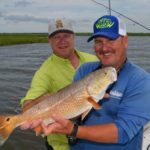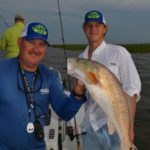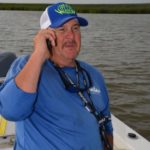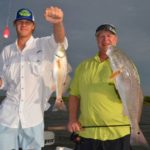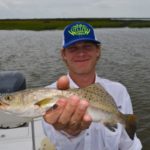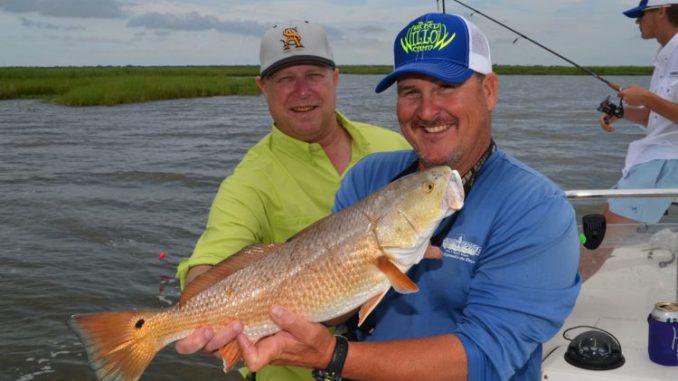
Teaming up with other boats can pay big dividends in the marsh.
The weather looked lousy as Creighton Ward, part owner and first captain of Southern Exposure Inland Fishing Charters, launched his boat from an obscure launch just north of the old Buras Auditorium into the Mississippi River.
It was overcast, threatening rain and worst of all the wind was honking.
The water just had to be dirty.
“I guess I’ll see if this tag team stuff really works or if it’s all baloney,” I thought to myself. A couple of months before, he fairly bragged about the success of his captains in putting their customers on speckled trout and redfish.
The charter service, he explained, has as many as eight captains working from the lodge he co-owns with Tim Anderson. In the mornings, they scatter to different points to search for fish. During the hunt, they stay in touch with each other using their cell phones.
When one finds fish, the others can zero in on the hotspot.
“That’s something your readers might like to know — how to build a team of fishermen to work together,” he told me after I met him. “Everyone benefits in the long run. It saves a lot of searching.”
Cherub-cheeked and ever-smiling, Ward pushed hard the concept that they want to provide more than a fishing experience; they want their customers to feel like family. The night before proved that the dining was great (see the Louisiana Seafood Bible column elsewhere in this issue), but now, the pressure was on to produce fish.
This wasn’t a public relations trip for an outdoors writer. He had two paying customers on board, Barry Enlow and his son Blayne, both of Sorrento, La.
Ward charged his boat directly across the Mississippi River, through the blowout in the riverbank next to the Ostrica Locks.
“This is going to be mostly redfish today because the wind is forcing us to fish on the east side of the river,” he shouted above the motor. “Usually, unless my customer has other preferences, I like to target speckled trout early in the day before the wind picks up, then go to redfish later.”
River water was snorting through Quarantine Bay when Ward jumped out of its north end and took a small canal across Bayou Lamoque at the site of the old 1958 freshwater siphon.
The marsh is vibrant and green, but in spite of a much larger Bayou Lamoque diversion having been run since 2010, area marshlands are still eroding rather than building. Although he is a supporter of river diversions to restore marshes, Ward likens to the current effort to “putting a band aid on a bullet wound.”
He entered the sadly geriatric-looking Cox Bay Oil and Gas Field canal system and punched out into Bay Long There, he got his customers onto combing the shoreline on a big point on the bay’s western shore.
He grabbed his cell phone to query one of his other tag team members. “What’s it like at the mouth of Bay August?
“Dirty!” he echoed the report. “Ugh, I know I’m not going there.”
The fishing was slow very early. But it wasn’t long before the predicted strong east-southeast wind strengthened and began slapping waves into the shoreline.
“Don’t worry guys,” he bucked up the Enlows. “We are in a lull in the tide now, but it will soon start running and we’ll catch. When they come in, sometimes it will be two at a time.” Ward had both men fishing with live shrimp under popping corks.
After moving the boat to the eastern shoreline of the bay, the men picked up a sheepshead, then a black drum, and even a freshwater catfish. When the whiskered fish came into the boat, the elder Enlow cracked, “I like to catch specks and reds best, but these eat good.”
Barry was a skilled fishermen with a good eye for seeing feeding fish and skittering bait. By focusing their attention on openings between broken islands and hitting little cuts and points, the pair began picking up redfish.
Ward was all over the boat, coaching, baiting hooks, and unhooking fish, in short doing everything but picking up a rod. “None of our captains fish,” he grinned, “so you get full attention from them.
“I went fishing once with a charter service and the captain caught 12 of the 15 fish. I didn’t pay him for me to watch him catch my fish,” he said disdainfully.
Much of the time, while he was controlling the trolling motor and Power-Poles, unhooking fish and rebaiting hooks, he kept up a running chatter with the other captains. “Let me call Tim (or whomever). Let me see how Mud Bay (or wherever) is.”
In between all that, he coached his anglers. “Keep your rod tip up. Get close to the shoreline. Over there — see that fish.”
But inevitably, the redfish bite played out and turned to small sheepshead. Ward quickly had enough of that, especially after his phone jangled.
Tim Anderson was on a strong redfish bite in Mud Bay, north of Quarantine Bay. Ward wasted no time running there and pulled his boat near the shoreline a quarter-mile from his partner’s boat. Both guides had their boats positioned to fish the bay’s northwest shoreline to keep the wind at their anglers’ backs.
The brisk wind that sprang up shortly after dawn continued without let up all morning. But the water was clearer here and the fish that came out of it were more brightly colored.
The rout was quickly on. They must have caught 40 more redfish, topped off with a lone speckled trout. Of course, they couldn’t keep them all since they hit their limits earlier.
Papa Bear Barry pooped out first, settling heavily on the bay boat’s padded bench seat. “If you don’t fish regularly, your body gets sore,” he explained unnecessarily. “Plus injuries — old injuries.”
But son Blayne charged on. With one down, Ward focused on keeping the younger man on fish by controlling the boat for perfect positioning and spotting tell-tale signs of redfish presence.
One fish after another was whipped and unceremoniously sent back overboard.
At 12:20 p.m., the young athlete silently lodged his hook in a rod eye and reeled up the slack in his line.
“You had enough?” asked Ward.
“Yeah, I’ve had enough,” Blayne replied. “Let’s go see if Miss Sheri has any crab cakes left at the lodge from last night.”
